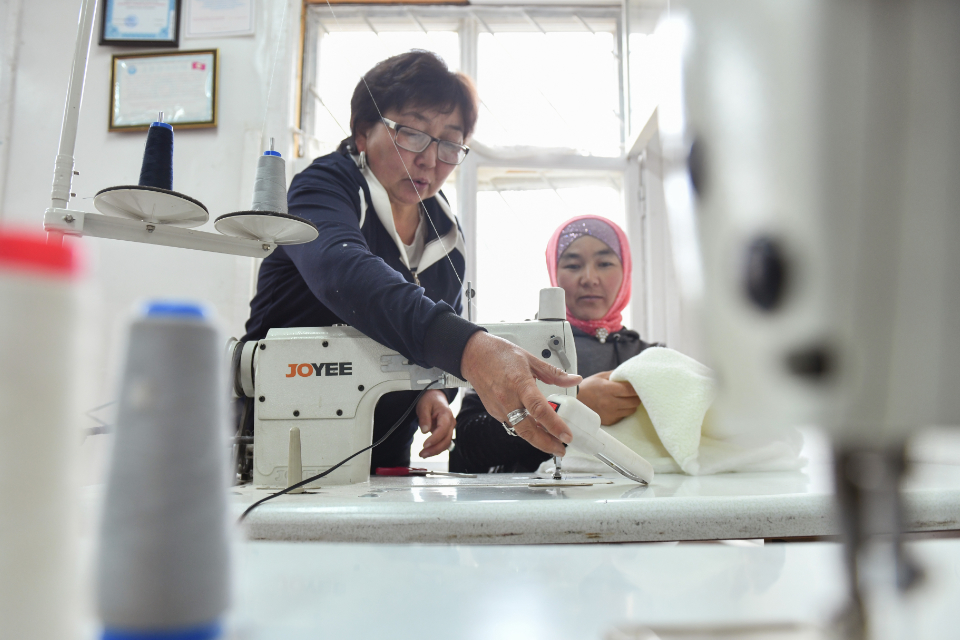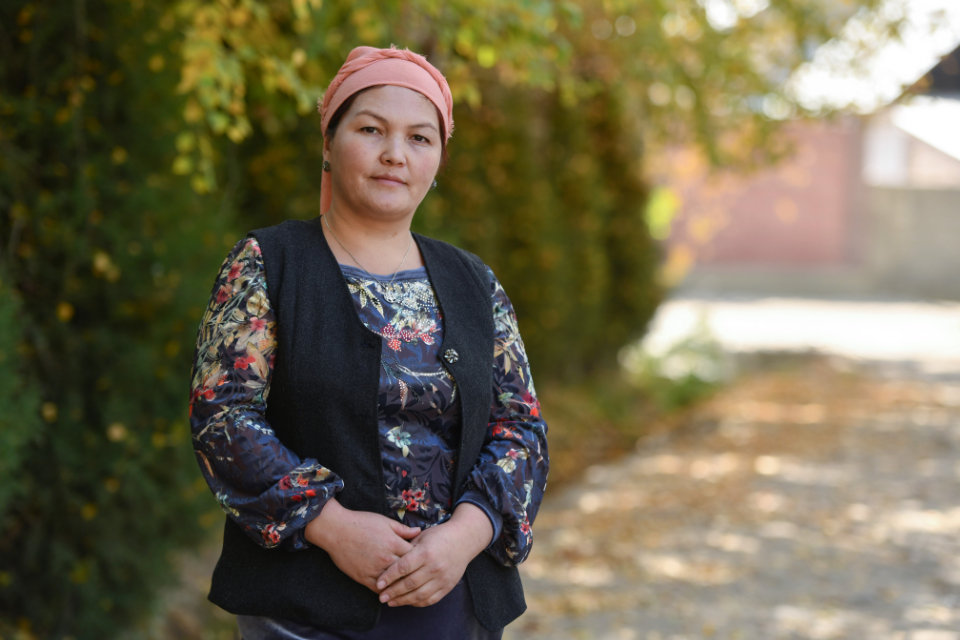Rural women can become successful entrepreneurs
In the remote villages of Kyrgyzstan, women without an education often find it difficult to gain work. In most cases they have to stay at home or leave to work in other countries, even though there are business opportunities in their local areas. Meet two women who smashed the prevailing stereotypes and became independent entrepreneurs, with the help of the rural women's economic empowerment (RWEE) project.Date:

“Once I dreamed of only two sewing machines, but now I have my own workshop. You need to dream and believe in success, and, of course, work hard,” says Elmira Sazanova, entrepreneur from one of the villages in the At-Bashy rayon of the Naryn oblast in Central Kyrgyzstan.
Elmira Sazanova juggles being a mother of four children and running her small sewing workshop in the village.
There is not much work for women in remote regions of Kyrgyzstan. Often busy with household chores, raising children, and helping their husbands in the household, women stay at home and rarely develop their own business. For example, of those employed in agriculture in Kyrgyzstan only 39.2 per cent are women, while only 20.6 per cent of the economic entities operating in agriculture are led by women.
Despite this, Elmira was a dreamer. She always believed in success and strived to achieve her goals. A lack of work in the 1990s led Elmira to tailor robes on her old sewing machine and sell them to neighbors and friends. After a while she realized that she could earn money from this. She needed at least a couple of professional sewing machines but lacked the funds to buy them.
Four UN agencies – UN Women, the Food and Agriculture Organization, the World Food Programme and the International Fund for Agricultural Development – launched the Rural Women’s Economic Empowerment Project. It is aimed at improving food security, promoting income-generating activities, increasing participation in public decision-making and creating a gender-sensitive culture in society. The programme targets vulnerable rural women and those living below the national poverty line of 2,700 KGS a month.
“In 2014, I found out about this project. They told me that they could help me to start a business. To be honest, I did not believe in this, but I still participated in the project, because I was interested, I went to training sessions and got a lot of useful information. We prepared and sent a project proposal to open a sewing workshop. And, then one day, the sewing machines arrived. And there were so many! I was surprised and confused: what to do with so many sewing machines, where to get the workers? But I overcame my fear and started working,” recalls Elmira.
Elmira face many difficulties. Her husband initially discouraged her, she struggled with cash flow and finding a big enough market, but she did not give up and continued, despite all the difficulties. Now the workshop is functioning well, and over the years dozens of women have worked in it. Elmira hires new employees even if they lack experience, explaining that almost every woman can be trained in sewing – the main thing is that she has a desire to learn and work.
Now the workshop serves the local population, and also sews small batches of orders coming from the capital city.
“We are very friendly here and help each other. We don't even buy clothes for a long time, we sew everything for ourselves, and when someone needs some special, we can quickly sew a beautiful dress. Difficulties first arose during the pandemic when orders stopped. But we had accumulated work and, in principle, we did not stop production, and then we began to sew masks,” Elmira says.
The women are also supported by the local authorities, who have allocated a building for the workshop. The owner of the enterprise notes that the main thing is to start with small steps, to work hard and then dreams will surely come true.

“To be honest, it was scary to start with … But everyone supported me.” – Nargiza Tabaldieva, entrepreneur from Uzgen rayon of Osh oblast.
Nargiza Tabaldieva, a mother of five children has not one career, but two. She is both a pastry chef and a specialist in a tourism project in her village. The most important thing is, Nargiza notes, that she does not have to travel abroad to find work.
“I got married at the age of 18, and have been living with my husband for 15 years and we have five children. We live with my husband's parents. My father-in-law has always been an activist who participates in various projects, and he suggested that I take part in a seminar delivered by the Rural Women’s Economic Empowerment project. I went to a meeting and I liked the idea of developing women's entrepreneurship and contributing to the development of the country's economy. My father-in-law and mother-in-law supported me, my mother was also always active and was engaged in a project in the field of tourism. It was her work that we decided to continue,” Nargiza says.
Now there are four groups of women working in the village: one group is engaged in the development of tourism in the summer, and in the winter in a pastry shop. The second group is engaged in handicrafts and sewing. The third makes dairy products, and the fourth breeds cattle breeding and sells meat.
Nargiza continued the work of her mother-in-law, together with other women from the village, she rented a plot and built a guest house, where in summer they received foreign tourists and guests from different regions of the country. In winter, Nargiza decided to engage in baking, since she has loved cooking sweets since her childhood, and now her fellow villagers order cakes and pastries from her workshop.
“To be honest, it was scary to start with and I wondered if I would cope. But when I talked to my family, everyone supported me. The support of my family was very important. I was lucky in this regard, because my mother-in-law and father-in-law are actively involved in business, they always worked and they told me that I needed to develop and work. Now I have no regrets at all and am glad that I made up my mind then. Of course, there are difficulties, but I'm not alone, we are a whole group of women and we cope with everything together. During the pandemic it was difficult, there were fewer tourists, respectively, there was less work, but despite all we continue to do our favorite business,” Nargiza notes.
She was convinced from her own experience that with the desire and support, you can create jobs at home, stay at home with your family and develop your native village. Nargiza calls on all women to unite and strive for the best, not to lose years of life abroad away from children and relatives, but to improve living conditions at home.